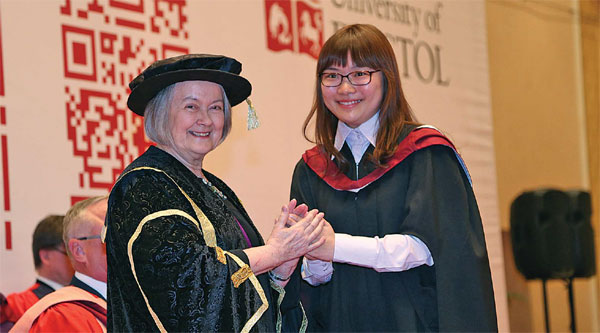Bridging Britain and Beijing
|
Baroness Hale, chancellor of the University of Bristol, at a graduation ceremony in Beijing with a Chinese student. Photos provided to China Daily |
Chinese students at UK university indicate a growing connection, says chancellor
For Baroness Hale, the increasing number of Chinese students at the University of Bristol is an indication of the growing connection between China and the outside world.
"Recent years have witnessed the increasing number of Chinese students who come to our university or other universities in Britain. As China becomes more open to the outside world, some foreign universities like Bristol play an essential role in bridging China and the West," says the university's 70-year-old chancellor.
Founded in 1876, the University of Bristol is one of the most renowned universities in the United Kingdom. Currently, about 16,000 undergraduates and 6,000 graduates from 120 countries study at the university. About 20 percent of students are from overseas.
The Chinese constitute a major part of the student body. There are 4,000 of them at the university, making them the largest overseas nationality.
Steve Lyne, the university's head of economics, finance and management, says the university holds great appeal for Chinese students.
"They are very keen to apply. We started receiving applications in October, and have had many from China since then. Some of the places didn't start until March, even April or May. We have had to stop applications from China to leave some for non-Chinese students and maintain diversity," says Lyne.
"The one-year master's program in our school is the most popular among Chinese applicants. We got nearly 6,000 applications from China this year, and the competition is quite fierce. The Chinese students constitutes more than 80 percent of the students we recruit this year."
Hale says Chinese students are always motivated and determined to succeed.
"Most of our students are hard-working, and the Chinese very much so. The Chinese at the start of their studies are more reserved compared with other students, and we spend a lot of time encouraging them to become more open. We require them, as part of the way we teach, to interact with staff and to express their ideas. It takes a while for them to become confident and express their ideas," says Hale.
Yang Sun, who graduated in accounting, economics and finance this year, says she enjoyed studying at the University of the Bristol.
"It's a globally renowned university which has strengths in many subjects such as economics. Besides its academic strength, the university also has a diverse culture. I got to know many people and make good friends from other countries and regions, which has broadened my horizons," says Yang.
Huang Jianqian, who studied finance and investment between 2008 and 2009 and is now working as an analyst at BDA Partners, says "The university emphasizes practical training, which gave me a deeper understanding of the financial markets. It is very useful to my work now."
Hale says that the university pays great attention to attracting Chinese students.
One example demonstrating their importance is that the university started holding graduation ceremonies in Beijing from 2013.
"We know that many of our Chinese students need to go home before the graduation ceremonies in Bristol. Therefore, we thought it would be a nice idea to hold the ceremony in Beijing, which will enable students and their parents to go through the whole graduation process," says Hale.
On April 18, a graduation ceremony for Chinese graduates from the University of Bristol was held in the Chinese capital. The university had 700 Chinese graduates and each was allowed to bring two or three guests to witness the ceremony. More than 1,000 people attended the celebration.
During the ceremony, Hale announced each of the graduates' names onstage. Students stepped onto the stage and received their graduation certificate from her.
"The university's only graduation ceremony outside Bristol is in China. This shows that Chinese students are very important for us. We plan to hold this kind of ceremony in Beijing every two years," says Hale.
Born in Yorkshire in the north of England, Hale was known as Brenda Hale before she was appointed to the House of Lords, the UK's upper house, in 2004 as a law lord. She is the only woman to hold such a position.
After obtaining a starred first-class degree from Girton College, Cambridge, she lectured in law and then became a barrister.
Hale was officially installed as the University of Bristol's seventh chancellor in 2004.
She spent a large part of her career as a judge and was made a dame in 2009. As deputy president of the Supreme Court of the UK, she is the most senior female judge in the country's history.
She says that besides the graduation ceremony, the university is also seeking academic collaboration with universities in China.
"So far, we don't have any formal cooperation with Chinese universities, but we have some cooperation in some academic studies. For instance, our Great Britain and China Centre has cooperation with the school of law at Renmin University. We expect we will have more cooperation with other Chinese universities in the future," says Hale.
Bai Chunli, president of the Chinese Academy of Sciences, was presented with an honorary degree during the ceremony in April, for his achievements in nanotechnology.
"Bristol also has great scenery. We do try very hard to attract more overseas students to increase our international influence. We try to help all of them to feel at home in Bristol and to also have some fun besides studying," says Hale, with a big smile.
huhaiyan@chinadaily.com.cn



















